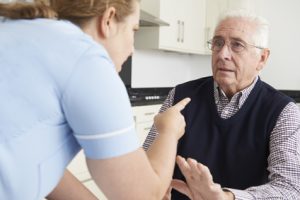 Elderly people are harmed or taken advantage of far too often by individuals trusted to provide care. Health care professionals that work in facilities or provide home care are not the only individuals to keep a mindful eye on. According to The National Center on Elderly Abuse, the most frequent offenders are family members of the patient. The best way to prevent or stop the abuse of your loved one is to recognize the warning signs and understand the risk factors of abuse and neglect.
Elderly people are harmed or taken advantage of far too often by individuals trusted to provide care. Health care professionals that work in facilities or provide home care are not the only individuals to keep a mindful eye on. According to The National Center on Elderly Abuse, the most frequent offenders are family members of the patient. The best way to prevent or stop the abuse of your loved one is to recognize the warning signs and understand the risk factors of abuse and neglect.
Types of Elder Abuse
Not all abuse claims are identical because the circumstances of inappropriate behavior can vary greatly from case to case. Understanding the common forms of abuse helps to identify the warning signs that there is something wrong with the way your loved one is being treated.
- Physical Abuse – Impairment, injuries, and pain inflicted by another person due to non-accidental contact. The use of restraints, forced confinement, and drug use not specified by a prescription are considered types of physical abuse scenarios.
- Emotional Abuse – Pain and distress to mental well-being caused by various forms of psychological abuse. Yelling or threatening with an intimidating tone, ridicule, humiliation, and placing blame on the victim are verbal forms of abuse. Isolation, terrorizing, and ignoring the elderly person are nonverbal forms of emotional abuse.
- Sexual Abuse – Inappropriate sexual contact without the consent of the elderly person. These actions do not have to involve touching as long as the situation is considered sexual in nature. A caregiver may force the patient to view pornographic material, watch sexual acts, or undress against their will.
- Neglect – According to Psychology Today, neglect can be defined as physical or psychological. Failing to take care of hygiene, forcing the person to survive in an unsanitary or harmful environment, not providing physical therapy or necessary medications, or leaving the patient alone without any social contact or activities are all neglectful conditions.
- Healthcare Abuse or Fraud – Unethical medical professionals that engage in fraudulent and harmful behaviors relating to the patient. Charging for unprovided services, over-medicating, under-medicating, double-billing, overcharging, prescribing certain drugs for referral incentives, Medicaid fraud, and making recommendations of fraudulent remedies are considered abusive actions.
- Financial Exploitation – Using the funds or personal property without the authorization of the elderly person. Actions might include stealing, forging the signature, stealing their identity, or misusing financial accounts without the person knowing. An outside scam artist may target elderly individuals with fraudulent investments, fake charities, or forcing the person to pay money to claim a phony prize.
Steps You Should Take
The elderly person that you love deserves to have you looking out for their safety so that they are never left vulnerable to the harmful actions of others. If you feel that they are in immediate danger, the best thing to do is alert authorities before it is too late. Otherwise, you may notice physical signs of abuse that require treatment from a hospital or other medical facility. Keep a photographic record of the injuries and living conditions if such evidence exists to support the claim. Report the incident to a local agency, even if you only suspect that there are conditions of abuse. It might be a smart idea to move your loved one to another care facility to prevent any form of retaliation carried out by the abusive individual.
The final and most important step is to contact the attorneys at Lundy Law to put an end to the suffering and neglect of the elderly person in your life. In the event that the nursing home is protecting their facility rather than patients, you need to have a lawyer on your side that specializes in fighting these types of sensitive cases. Do not hesitate to give us a call regardless of the evidence so that we can ensure that your loved one is provided the care and attention they deserve.
















